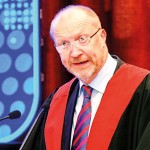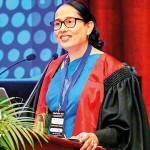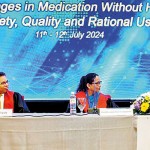News
Prescribing Safety Assessment for medicines to be introduced in Sri Lanka
View(s):- Medication safety the most common “preventable” cause of patient harm in healthcare worldwide, accounting for nearly 50% of all medical errors
It was good news for a country which has been grappling with serious allegations and issues over the safety of medications being doled out to the public.
Plans to introduce a ‘Prescribing Safety Assessment’ (PSA) were announced with much enthusiasm at ‘ClinPharm 2024’, a landmark conference held by the Sri Lanka Association of Clinical Pharmacology and Therapeutics (SLACPT) in collaboration with the International Union of Basic and Clinical Pharmacology (IUPHAR) from July 10-13 in Colombo.
Held in the interests of advancing clinical pharmacology and medication safety, another unique feature of the conference on the theme ‘Challenges in Medication Without Harm: Safety, Quality and Rational Use’ at the BMICH, was the example it set. The inauguration and conference were held with not a single sponsorship from a pharmaceutical company.
While overseas resource persons were drawn from the United Kingdom (UK), Switzerland, India and Australia, the local participants – doctors, nurses and pharmacists critical for medication safety collaboration – were from both government and private hospitals and pharmacies.
Excitedly announcing the plans to introduce a PSA, similar to the assessment in the UK, SLACPT President Prof. Priyadarshani Galappatthy said that it would be done in collaboration with the British Pharmacological Society and the Sri Lanka Medical Council (SLMC).
She described how SLMC President Prof. Vajira Dissanayake was supportive of this initiative and how Guest-of-Honour Prof. Simon Maxwell, Professor of Clinical Pharmacology and Prescribing at the University of Edinburgh, UK, had conducted an excellent workshop to “help make us understand more about the operational aspects of the assessment”.
- Prof. Priyadarshani Galappatthy awarding the orator’s medal to Prof Caroline Samer who is President-elect of IUPHAR
- Prof. Simon Maxwell delivering the keynote address
- Prof. Priyadarshani Galappatthy addressing the gathering
- SLACPT conference inauguration (from left): SLACPT Secretary Prof. Priyanga Ranasinghe; Health Secretary Dr. Palitha Mahipala; SLACPT President Prof. Priyadarshani Galappatthy; Guest-of-Honour Prof. Simon Maxwell; and SLACPT Orator 2024 Prof. Caroline Samer
Focusing on the importance of the conference, Prof. Galappatthy underscored that medication safety was the most common “preventable” cause of patient harm in healthcare, accounting for nearly 50% of all medical errors. In 2017, the World Health Organization (WHO) launched the Global Patient Safety Challenge: Medication Without Harm, aiming to reduce severe avoidable patient harm.
“Under our conference theme, we highlighted the burden of medication-related harm and the approaches to address it based on the WHO Strategic Framework,” she said, explaining that Sri Lanka’s Health Ministry had a while ago launched the National Action Plan on Medication Safety, developed on the WHO Strategic Framework, through the Directorate of Healthcare Quality and Safety.
Her hope was that the conference would have helped to consolidate the successful implementation of the National Action Plan by all stakeholders.
Prof. Galappatthy also turned the spotlight on education on medication safety in undergraduate curricula for doctors, pharmacists and nurses, calling it “critical” as prescribed medicines by doctors are dispensed by pharmacists and administered by nurses. She said that Sri Lanka took steps to introduce the WHO medication safety curriculum to medical curricula in 2021 and now plans are afoot to do the same for pharmacy and nursing curricula.
Delving into the conference programme, she said that in-depth discussions revolved around the four domains and three key action areas of the WHO Strategic Framework, explored medication safety curricula and examined prescribing safety assessments and country experiences.
She made special mention of the Post-congress Workshop on Rational and Cost-effective Prescribing, detailing how the SLACPT has developed many guidelines and monitoring mechanisms collaborating with other relevant specialist colleges as an initiative through the Sri Lanka Medical Association (SLMA) Intercollegiate Committee, on the use of medicines that cost most in Sri Lanka’s drug budget.
“We are spending over Rs. 4 billion annually on medicines such as tenecteplase, IV immunoglobulin, human albumin and Factor VIII,” she said, pointing out that they also developed guidelines on the use of most commonly prescribed medicines from the OPD (Outpatients’ Department). Monitoring their use by collaborating with respective specialist colleges will be critical in implementing the guidelines.
Discussions had also been held on health technology assessment and how to identify cost-effective medicines for Sri Lanka which would help to manage the drug budget and avoid medicine shortages in the future.
The Chief Guest at the inauguration was Health Secretary Dr. Palitha Mahipala while the keynote address was by Prof. Simon Maxwell. Prof. Caroline Samer, Professor of Pharmacology and Clinical Toxicology at the University of Geneva, Switzerland, delivered the SLACPT Oration 2024 on ‘Precision Medicine and Pharmacotherapy: The Right Drug at the Right Dose for the Right Patient’. (KH)
The best way to say that you found the home of your dreams is by finding it on Hitad.lk. We have listings for apartments for sale or rent in Sri Lanka, no matter what locale you're looking for! Whether you live in Colombo, Galle, Kandy, Matara, Jaffna and more - we've got them all!





